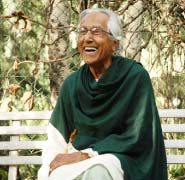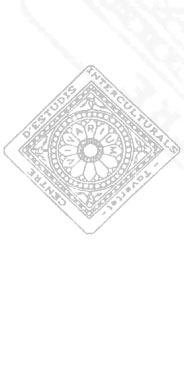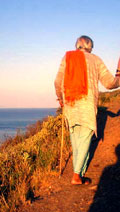



VITAL AND INTELLECTUAL JOURNEYS
2. A Multicultural and Multireligious Origin. From Barcelona to Rome, via Bonn, Madrid and Salamanca (1918-1954)
Raimon Panikkar i Alemany was born on November 3rd 1918 in in the borough of Sarrià in Barcelona. His origins, though, are unusual in that his mother was Catalan and Catholic (Carme Alemany, †1975), from an important bourgeois family, and his father is Indian and Hindu (Ramuni Panikkar, †1954), a Malabar of aristocratic origin and British nationality, who settled as a businessman in Barcelona in 1916 (Spain was neutral during the First World War) and lived there until the end of his life. They had four children (Raimon, Josep Maria, Mercé and Salvador). Raimon has explained how much he owes to his family roots: “There was a profound harmony between my father and my mother, in spite of belonging to two different traditions”.
From an early age, Panikkar tried to bring together his multicultural origin with his deep religious and metaphysical leanings: “I don’t see myself as half Spanish and half Indian, half Catholic and half Hindu, but fully Western and fully Eastern”. “I’ve always been someone concerned about what is usually called the religious problem.”
Panikkar attended school with the Jesuits in Barcelona, receiving an “Extraordinary Award” when he completed high school (1935). During 1936-1942 he was a university student of both Science and Humanities. His willingness to integrate the whole of reality was already implicit in the early steps of Panikkar’s intellectual journey. This calling led him to take graduate studies in Science, Philosophy and Theology in a number of universities in Spain (Barcelona and Madrid), Germany (Bonn) and Italy (Lateran University, Roma).
The Spanish Civil War put his family at risk. He left for Germany, where he spent three years studying Physics, Mathematics, Philosophy and Theology. He returned to Spain in the summer of 1939, planning to go back to Germany to get his degree. But the outbreak of the Second World War prevented his return. Panikkar completed his degrees in Spain, obtaining a MSc from Barcelona University (1941) and a MPhil from Madrid University (1942).
In Barcelona he undertook further studies and worked for the family business. He returned to Madrid and obtained his Doctorate in Philosophy in 1946 with a dissertation on The Concept of Nature, which was awarded the Premio Menéndez Pelayo and became his first book (El concepto de Naturaleza, 1951). Panikkar writes in the Introduction: “Concerned about the theological problem of what is beyond nature as metaphysical substratum of an integral anthropology that would explain the specific and personal man, the real and historical Christian, I had to deal first with the metaphysical problem of nature”.
In 1940 Panikkar joined a group of laymen (later on to become the Opus Dei) that were trying to achieve a full Christian life within their professional work. Raimon Panikkar met Escrivá de Balaguer, its founder, shortly after having returned from Germany, and they established a close relationship. Panikkar was for twenty years a numerary member of this Roman Catholic organization for tweenty years, first in Barcelona and then in Madrid. In 1945 Escrivá de Balaguer himself suggested Panikkar to become a priest; Panikkar was ordained the same year of his Philosophy doctorate (1946) and became a chaplain at the Colegio Major la Moncloa, working actively with both priests and laypeople. Since he left Opus Dei, Panikkar has been incardinated at the Indian diocese of Varanasi.
Panikkar has never been very keen to speak about his relationship with Opus Dei. The only time he made a public statement was in Alberto Moncada’s book Historia oral del Opus Dei (Barcelona 1987), where he says he didn’t join Opus Dei as one joins “a club”, but as a Church organization. Before that we only have a brief remark in his autobiographical book Cometas: “I do not repent of that period of my life… life’s line is neither straight nor zigzag”.
In Madrid he got closely in touch with well-known Philosophy professors like Laín Entralgo, García Morente and Xabier Zubiri. They offered Panikkar a Chair in Philosophy at Madrid University, but Escrivá de Balaguer was not keen on it, as he wanted Panikkar’s exclusive pastoral dedication. Panikkar lived in Madrid until 1950; during these years he taught Philosophy of History and Psychology at the University, taught Comparative Cultures at the Seminario Diocesano and Religious Sociology at the Instituto de Ciencias Sociales León XIII, and was also Guest Lecturer at a number of universities (Visiting Professor at the Universidad Internacional de Santander, Universidad Hispanoamericana de la Rábida…).
In those years Panikkar was also Secretary General of the Philosophy Congress of Barcelona (1948), and first secretary of the Sociedad Española de Filosofía. From 1942 onwards he became a member of the Consejo Superior de Investigaciones Científicas and the Instituto de Filosofía Luis Vives, and was one of the promoters of the Síntesis journal (1943), which was to later evolve into the Arbor journal, which has been published since 1944 and cofounded by Panikkar.
At that time Panikkar had already started to write profusely. Part of those writings will remain unpublished (Praxis cristiana de la inteligencia, Mysterium Crucis, Introducción a la esperanza…) and the rest were brought to light in a number of journals and in his early books. Panikkar often published in Arbor and other jouranals from Spain (Revista de Filosofía, Nuestro Tiempo, Indice, Atlántida, La Actualidad Española...), Latin America (Sapientia, Revista de Teología de La Plata... ), France (La Table Ronde), Italy (Studi Cattolici), Germany (Wort und Wahrheit, Politeia, Dokumente, Neues Abendland...), and so on. He was the first director of the “Colección Patmos” in the Rialp publishing house, where he published some of his first books: La India. Gente, cultura y creencias (1960), awarded with the Spanish Premio Nacional de Literatura; Patriotismo y cristiandad. Una investigación teológico-histórica sobre el patriotismo cristiano (1961) and Humanismo y cruz (1963). He had some trouble with the high ranks of the Spanish Church due to his Foreword to J. Guitton’s book La Virgen María (1952), published in the Colección Patmos.
Also in those years (but published many years later) Panikkar wrote a very personal book reflecting his experience before moving to India: Cometas. Fragmentos de un diario espiritual de la postguerra (Madrid, 1972).
After three years in Salamanca, at the end of 1953 Panikkar moved to Rome and stays there for one year in order to complete his theological studies. Besides his studies at the Lateran University (Master in Theology in 1954), Panikkar was conciliar of a Collegio Maggiore, a position that helped him to be in touch with Rome’s intellectual, philosophical and theological environment.
*1. An Outstanding Man. Raimon Panikkar’s Fourfold Identity
*3. India. Christian-Hindu-Buddhist symbiosis. Meeting Monchanin and Le Saux (1955-1966)
*4. University teaching in California (1966-1987)
*5. His return to his Catalan roots to complete his vital cycle
*6. Raimon Panikkar: Writing as a Life-style
*7. Several Panikkars or a continuity within diversity?
